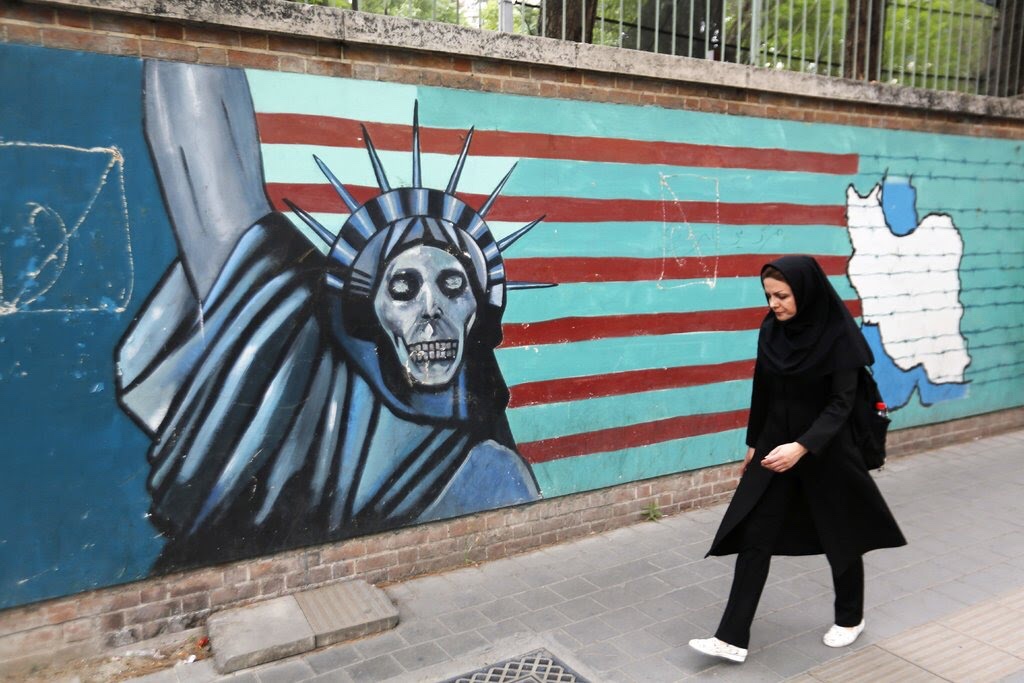 The president’s eye on Iran
The president’s eye on Iran
ANALYSIS/OPINION:
Diplomat-speak is not President Trump’s greatest talent, but recognizing threats to U.S. national security is, and the civilized world can be grateful. The president’s blunt language describing why the United States must keep an eye on Iran from a watching post in neighboring Iraq did not please the mullahs in Tehran, but America and the West expect nothing less from the president of the United States. As the Islamic regime repeats a vow to conquer the West, an unblinking watch must be preserved.
Mr. Trump told interviewers at CBS News this week that he intends to keep U.S. troops at Iraq’s Al-Asad military base to monitor Iran’s behavior. “It’s perfectly situated for looking at all over different parts of the troubled Middle East rather than pulling up,” he said, and he wants to keep the base “because I want to be able to watch Iran.”
In his State of the Union address the president reiterated his intention to guard against the peril posed by the Islamic republic: “We will not avert our eyes from a regime that chants death to America and threatens genocide against the Jewish people.” After his announcement that he intends to pull U.S. forces out of Syria and Afghanistan, the president’s remarks reassured allies, including Iraq, that he will not cut and run from the region.
“Taking offense” is a way of life in the cradle of civilization — it’s a custom growing popular everywhere, including the United States — and the Iraqis were rocked by Mr. Trump’s plain talk. “The [American] troops in Iraq are operating based on the agreement between the government of Iraq and the United States for the specific mission of combating terrorism,” Iraqi President Iraq Barham Salih told the Daily Beast. “Iraq’s constitution does not allow our territory of our country to be used against our neighbors.”
Combating terrorism is precisely the mission of U.S. forces in the Middle East, and the key is keeping a wary eye on Iran, the world’s foremost sponsor of terrorism, but Islamic politicians lobby the Iraqi Parliament to expel U.S. troops. If only. But for our friends there, the Middle East is not worth the life of a single American soldier, and the U.S. public would like nothing better than to see nearly three decades of on-again, off-again U.S. involvement there come to an end.
Common sense dictates otherwise. At a time when the Iranian regime is parading advanced, precision-guided missiles capable of striking Israel and U.S. forces through the streets of Tehran, withdrawal is not a reasonable option. Guidance technology has just been installed on a new class of longer-range munitions that can fly 1,250 miles, according to the Iranian news agency Fars. Additionally, the regime introduced a long-range cruise missile last week, accompanied by a threat to Israel from the Iranian Revolutionary Guard that armed conflict would “definitely lead to elimination [of Israel].”
The president has withdrawn the United States from the foolish 2015 Iran nuclear deal, but the need to cast a wary eye survives. Ali Akbar Salehi, head of the Atomic Energy Organization of Iran, reports that Tehran has acquired the technical skills to design and build advanced uranium enrichment centrifuges, and is no longer dependent on reverse-engineering older models.
More disturbing, David Albright, formerly inspector of the International Atomic Energy Agency (IAEA), and several colleagues issued a report last month accusing Iran of failing to disclose to the IAEA its plans to build “a large, secret underground nuclear tunnel complex at the Parchin site, about 35 kilometers from Tehran.” Details of the so-called “Amad Plan,” taken from a Tehran warehouse by Israeli intelligence agents last year, document efforts by Iran to produce components for nuclear warheads.
This disclosure has embarrassed the international agency, which has made great effort to persuade the world that Iran has fully met its disclosure obligations under the terms of the late and lamented nuclear deal. If the regime has indeed lied about the existence of a secret nuclear facility, it’s reasonable to ask whether the mullahs are guarding other nuclear secrets beyond the view of inspectors.
Mr. Trump ruffled robes in Baghdad by suggesting that Iraq is a useful post for a neighborhood watch, but the job of combating terrorism necessarily means keeping an eye on Iran, where Marquess of Queensberry Rules of fair play are honored only in the breach. It’s a game an American president dare not play.
No comments:
Post a Comment